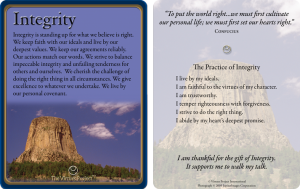“Imagine a school that expected its students to become literate without any formal instruction. Most parents would be alarmed by such an approach, which would leave their children confused and with gaps in their understanding. This however has been the philosophy on character development in many of our schools. Why is the development of character seen as somehow different from the other skills that we teach? Is it because the concept of being good has fallen out of fashion?”
This was the opening paragraph written by a colleague of mine, Geoff Smith, from the UK for The Guardian Teacher Network. For a little over a decade we have been so focused on academic rigor and competing with other countries, that we have lost sight of what is the true essence of education, to help develop the Whole Child. When we focus on the social, emotional, physical, intellectual and spiritual domains of children, they have a greater chance of developing into Whole Adults.
When we take time in schools to be intentional about creating communities that are healthy, safe, engaging, supportive, and challenging, not only are students more successful academically, their overall wellbeing improves, they are more compassionate and they are able to make a positive contribution to society.
Paula Mirk’s post on The Whole Child Blog entitled, Evaluating Teachers on the Hidden Curriculum, discusses how “teachers should be evaluated on the atmosphere they create in their classrooms and the degree of trust they have established with their students.” The “hidden curriculum” is more about our actions than the content of what we are teaching. Are we calling our students to respect in a respectful manner, or are we publicly shaming them? If being reliable and turning in assignments promptly is part of the class expectations, is the teacher reliable in giving feedback to students in a timely manner?
As Ralph Waldo Emerson once said, “What you do speaks so loudly that I cannot hear what you say.” It is time for all of us to model integrity and to be intentional about teaching our students the power of virtues. 

0 Comments